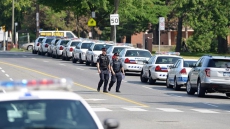Mike Farnworth, Minister of Public Safety and Solicitor General, is using extraordinary powers under a state of provincial emergency to keep British Columbians safe, maintain essential goods and services, and support the Province’s ongoing response to novel coronavirus (COVID-19).
“B.C. is in a strong position to effectively respond to and recover from the COVID-19 pandemic,” said Farnworth. “Informed by the direction of the provincial health officer, we’re taking these critical steps to keep our communities safe, goods moving and essential service workers supported.”
This is not a drill, it's a pandemic.
— John Horgan (@jjhorgan) March 26, 2020
It's why we all need to work together, and today's measures will help British Columbians do that. pic.twitter.com/vNNXPspjyV
Using the extraordinary powers under the Emergency Program Act, the minister is issuing a series of ministerial orders to ensure a co-ordinated response to COVID-19 across all levels of government for the duration of the provincial emergency. These include:
Supply chain: Establishing a new Provincial Supply Chain Coordination Unit to co-ordinate goods and services distribution; taking a more active role in co-ordinating essential goods and services movement by land, air, marine and rail; and suspending any bylaws that restrict goods delivery at any time of day.
Protecting consumers: Banning the secondary resale of food, medical supplies, personal protective equipment, cleaning and other essential supplies; and restricting quantities of items purchased at point of sale.
Enforcement: Enabling municipal bylaw officers to support enforcement of the provincial health officer’s orders for business closures and gatherings, in line with offences under the Public Health Act.
Travel: Ensuring all passenger and car-ferry services provide minimum service levels and priority access for residents, and essential goods and workers.
Protecting B.C.’s most vulnerable: Making it easier to support critical services for vulnerable people, like food banks and shelters.
Co-ordination: Suspending local states of emergency specific to the COVID-19 pandemic, except for the City of Vancouver; giving municipal councils the ability to hold more flexible meetings to expedite decisions; and co-ordinating potential use of local publicly owned facilities, like community centres, for self-isolation, testing, medical care, warehousing and distribution.
These unprecedented steps, made based on the recommendation of B.C.’s health and emergency management officials and invoked for the first time under a provincial state of emergency, will support the provincial health officer and minister of health in a co-ordinated cross-government approach to COVID-19 response and recovery.
Farnworth added, “Many local governments, First Nations and partners have stepped up to make sure they have prepared to protect their communities from the impacts of COVID-19. Today’s measures will make sure communities are taking necessary steps, in co-ordination with the Province, to get ready should more action be required to combat COVID-19.”
The Province, in consultation with the Dr. Bonnie Henry, B.C.'s provincial health officer, has defined essential services British Columbians rely on in their daily lives in the context of COVID-19 response and recovery. This is distinct from essential service designations under the Province's Labour Relations Code.
In consultation with the provincial health officer, any business or service that has not been ordered to close, and is also not identified on the essential service list, may stay open if it can adapt its services and workplace to the orders and recommendations of the PHO.
“In these new and challenging times we are facing, we’re asking British Columbians to stay strong as a community, and together we can get through this,” said Adrian Dix, Minister of Health. “I’m proud of the strategic measures we have enacted government-wide to help our families and health-care workers, to keep them safe and supported. By issuing a series of ministerial orders, we recognize that this is not forever, but it is for now. With everyone stepping in and respecting the extraordinary means we have to take, we will overcome this.”
Farnworth declared a provincial state of emergency on March 18, 2020, after the provincial health officer declared a public health emergency on March 17. The Province previously declared states of emergency in 1998, 2003, 2017 and 2018 – all related to wildfires. In each of those previous declarations, necessary actions were able to be taken without issuing minister’s orders under the Emergency Program Act.
Quick Facts:
Declarations of provincial states of emergency may be issued by the minister responsible under the Emergency Program Act.
The provincial government can extend the period of a declaration made by the minister responsible for further periods of time.
During the 2017 wildfire season, the Province was in a provincial state of emergency for 10 weeks from July 7 to Sept. 15.
BC is taking critical new steps to respond to and recover from COVID-19:
— John Horgan (@jjhorgan) March 26, 2020
• Taking active role in coordinating supply chain of goods
• Banning secondary resale of food & supplies
• Enabling bylaw officers to enforce health orders
Learn more:https://t.co/zmxfskJCw9
Highlights Of The British Columbia's Government's Emergency Pandemic Response
VICTORIA - The B.C. government stepped up its efforts under the Emergency Program Act on Thursday to ensure, among other things, that goods and services are getting to those who need them. Here's a look at what is happening:
— A new government unit will co-ordinate the distribution of goods and services, while bylaws that restrict the delivery of goods to certain times of the day are being suspended.
— The province is going after the black market, banning the resale of food, medical supplies, personal protective equipment and cleaning products.
— Municipal bylaw officers will enforce business closures and the size of gatherings to the limits that have been instituted by the provincial health officer.
— All passenger and car-ferry services are guaranteed to provide minimum service levels and priority access for residents, as well as essential goods and workers.
— Local states of emergency on the COVID-19 pandemic are being suspended, except for Vancouver, to give municipal councils the ability to hold more flexible meetings to expedite decisions.
— By suspending local states of emergencies, the province says it allows for the co-ordination needed to potentially use local publicly owned facilities — such as community centres — for self-isolation, testing, medical care, warehousing and distribution.



